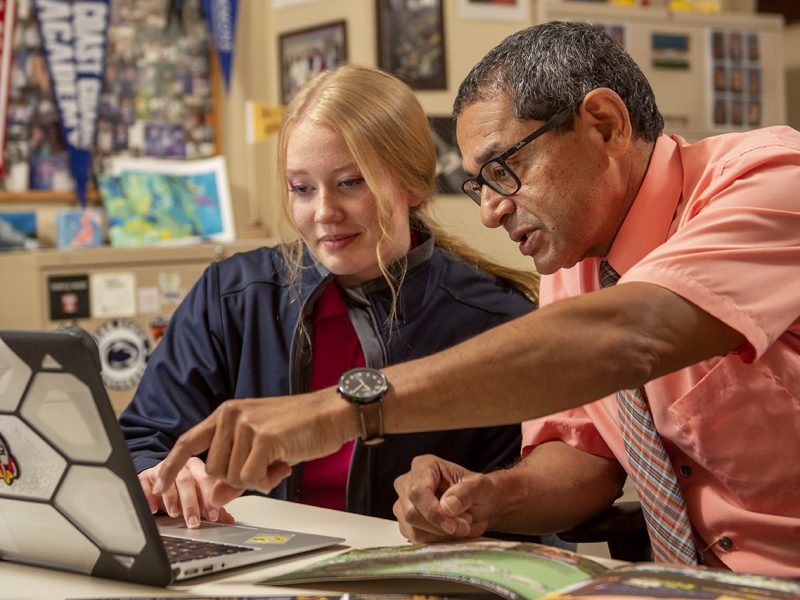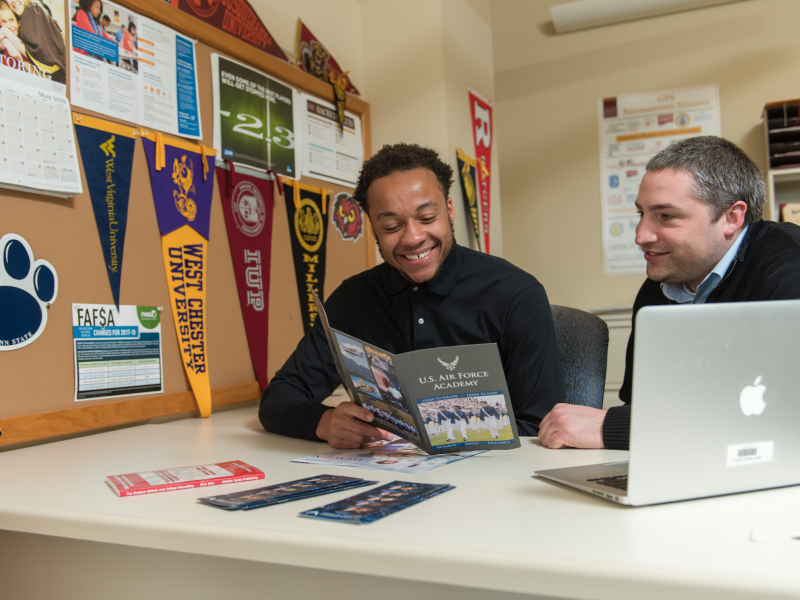Keeping Students’ College Futures in Focus Despite COVID-19
Featuring Tanya Baynham, MHS Vice President of Graduate Programs for Success
High school seniors are approaching an important time of year—college application deadline season. We all know 2020-21 is a different school year for everyone. Acknowledging that elephant in the room does not take away from the excitement of high school graduation and what comes next for our senior class at Milton Hershey School. With that said, it’s also natural for students (and their parents/sponsors) to feel a heightened sense of uncertainty or anxiety about college and making a big life decision this year.
Seniors are asking: How can I plan for my future when circumstances could change anytime? What are my options for college in the time of COVID-19? Should I take a gap year or consider community college? Parents/sponsors, meanwhile, are evaluating the financials and asking: What does on-campus housing look like? What emotional and learning supports are available for my child?

Tanya Baynham, MHS Vice President of Graduate Programs for Success (GPS), and other members of GPS staff are helping MHS seniors and their parents/sponsors answer these tough questions as they make decisions about applications, majors, and everything in between.
“2020 has presented students with new challenges and unknowns,” Baynham said. “College visits, the application process, and campus life look vastly different than ever before. If students and parents/sponsors are strategic and ask the right questions, they can make the decision that is right for them.”

An MHS college and career counselor talks with a male high school student and options for after graduation.
As students and parents/sponsors continue to navigate the world of post-graduation planning, here are some tips that might be helpful in determining the college option that works best for them.
- Learn About Schools Virtually: Students often make their final college decision based on the campus tour. Many post-secondary institutions offer virtual college visits or modified, small group tours with physical distancing in mind. Tour guides will still answer questions about academic and student life just as they would in-person. Setting up a time to talk to current students or recent graduates from the top schools of your choice on the phone or through video chat is another way to get an inside look at the on-campus experience. This also gives insight as to how the school is handling the pandemic and what the learning environment is really like.
- Know Your Learning Style: While we don’t know what college campuses will look like this time next year, seeing how schools have responded to the pandemic and what their learning environment is like now is a good indicator of what is in store for the summer and fall semesters. The Class of 2021 has experienced both in-classroom and online learning in recent months at MHS, so they should have an idea of which learning style fits them and how they can best succeed in their academics.
- Consider Your Major: Many first-year college students enter with undecided majors allowing them to explore the many opportunities available. However, there are some majors or areas of study that may look different if course work goes virtual again. Asking questions about how lab-based classes are conducted and how the school implements virtual or physically-distant learning will make a difference when deciding if a particular school can help you achieve your desired degree.
- Evaluate Housing Options: Have honest conversations about housing as part of the application process. Many colleges have reduced on-campus housing options, so if you find yourself in a situation where you cannot stay home for the first semester, work in advance to understand your options and create a budget. Students may have to ask themselves: Can virtual learning be done at home if there are younger siblings that need help? Is there a private space to study? Can I access a reliable WiFi connection? How to balance a full course load if I also have a full- or part-time job? Students need to make sure that whatever environment they are learning in is setting them up for success.
- Confirm Access to Support Services: Many students rely on on-campus counseling centers and learning centers for help managing their mental health and academic support. It is important to understand how colleges are accommodating students’ needs, such as appointments with counselors or tutors, even if they are done virtually.
- Understanding Transfer Credits: Students may consider completing general education credits at a local community college to save money on tuition. If this is an option a student is evaluating, confirm that their top choice college accepts transfer credits so all efforts are accounted for when they pursue their four-year degree. Financial aid may be different for transfer credits so be mindful of these deadlines and requirements.
Learn More About How MHS Helps Students Prepare for College and Career
Milton Hershey School is carefully following federal and state guidelines, CDC considerations, and MHS-established health and safety protocols to keep our campus a safe, nurturing, and healthy place. Any group photos of unmasked subjects were taken prior to the face coverings mandate.

